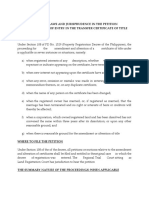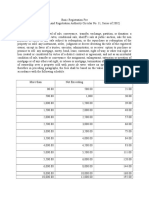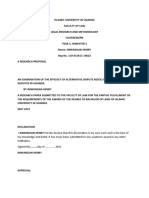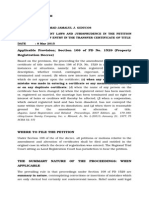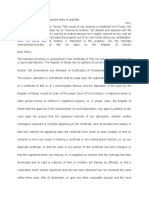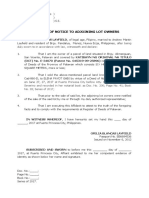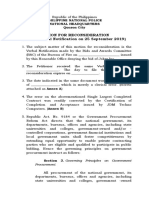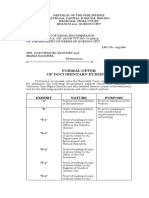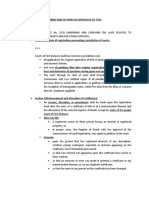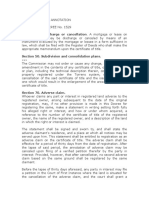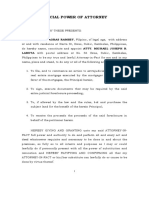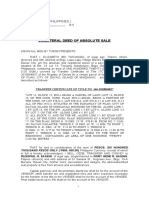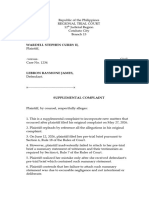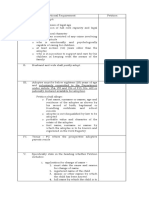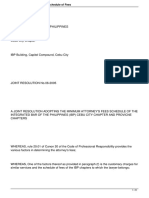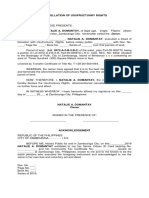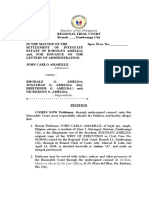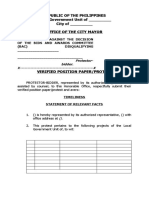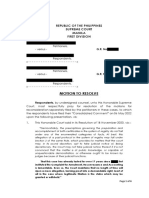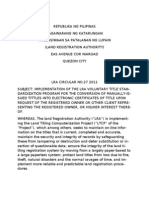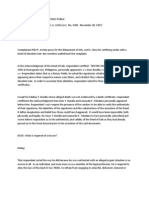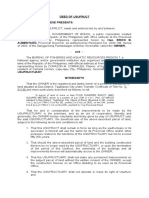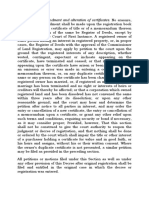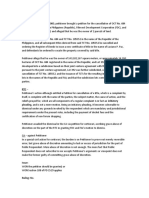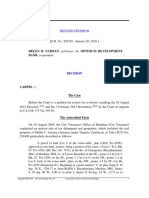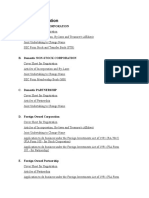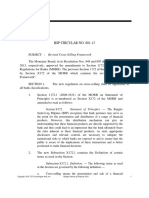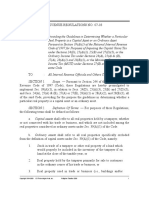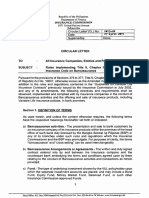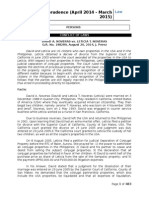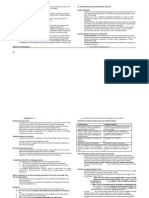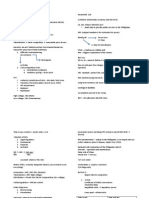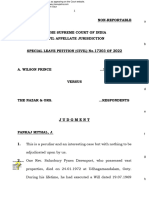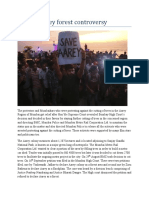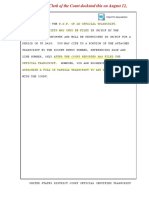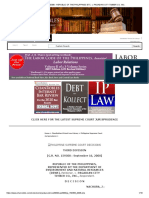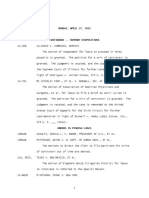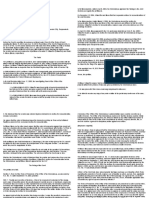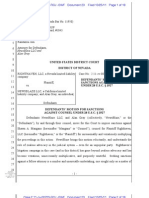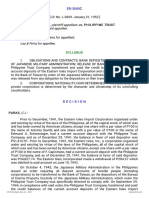0 ratings0% found this document useful (0 votes)
493 viewsPD 1529 Section 108 Jurisprudence
PD 1529 Section 108 Jurisprudence
Uploaded by
Nash Ortiz LuisSection 108 of P.D. No. 1529 outlines the process for amending or altering certificates of title registered under the Land Registration Act. It allows parties to petition the court for amendment in seven situations: when registered interests have terminated or changed, when new interests have arisen, when errors or omissions exist, when a name has changed, when marital status has changed, when a dissolved corporation has not conveyed land, or for other reasonable grounds. The court can order new certificates or alterations if notice is given and no purchaser's rights are impaired. This case found the petitioner was actually seeking reconveyance of property, not cancellation as outlined, so their petition did not fall under Section 108.
Copyright:
© All Rights Reserved
Available Formats
Download as DOCX, PDF, TXT or read online from Scribd
PD 1529 Section 108 Jurisprudence
PD 1529 Section 108 Jurisprudence
Uploaded by
Nash Ortiz Luis0 ratings0% found this document useful (0 votes)
493 views2 pagesSection 108 of P.D. No. 1529 outlines the process for amending or altering certificates of title registered under the Land Registration Act. It allows parties to petition the court for amendment in seven situations: when registered interests have terminated or changed, when new interests have arisen, when errors or omissions exist, when a name has changed, when marital status has changed, when a dissolved corporation has not conveyed land, or for other reasonable grounds. The court can order new certificates or alterations if notice is given and no purchaser's rights are impaired. This case found the petitioner was actually seeking reconveyance of property, not cancellation as outlined, so their petition did not fall under Section 108.
Original Description:
PD 1529 Section 108 Jurisprudence
Copyright
© © All Rights Reserved
Available Formats
DOCX, PDF, TXT or read online from Scribd
Share this document
Did you find this document useful?
Is this content inappropriate?
Section 108 of P.D. No. 1529 outlines the process for amending or altering certificates of title registered under the Land Registration Act. It allows parties to petition the court for amendment in seven situations: when registered interests have terminated or changed, when new interests have arisen, when errors or omissions exist, when a name has changed, when marital status has changed, when a dissolved corporation has not conveyed land, or for other reasonable grounds. The court can order new certificates or alterations if notice is given and no purchaser's rights are impaired. This case found the petitioner was actually seeking reconveyance of property, not cancellation as outlined, so their petition did not fall under Section 108.
Copyright:
© All Rights Reserved
Available Formats
Download as DOCX, PDF, TXT or read online from Scribd
Download as docx, pdf, or txt
0 ratings0% found this document useful (0 votes)
493 views2 pagesPD 1529 Section 108 Jurisprudence
PD 1529 Section 108 Jurisprudence
Uploaded by
Nash Ortiz LuisSection 108 of P.D. No. 1529 outlines the process for amending or altering certificates of title registered under the Land Registration Act. It allows parties to petition the court for amendment in seven situations: when registered interests have terminated or changed, when new interests have arisen, when errors or omissions exist, when a name has changed, when marital status has changed, when a dissolved corporation has not conveyed land, or for other reasonable grounds. The court can order new certificates or alterations if notice is given and no purchaser's rights are impaired. This case found the petitioner was actually seeking reconveyance of property, not cancellation as outlined, so their petition did not fall under Section 108.
Copyright:
© All Rights Reserved
Available Formats
Download as DOCX, PDF, TXT or read online from Scribd
Download as docx, pdf, or txt
You are on page 1of 2
Section 108 of P.D. No.
1529 reads as follows:
Section 108. Amendment and alteration of certificates. – No erasure, alteration, or
amendment shall be made upon the registration book after the entry of a certificate of
title or of a memorandum thereon and the attestation of the same by the Register of
Deeds, except by order of the proper Court of First Instance. A registered owner or
other person having interest in the registered property, or, in proper cases, the Register
of Deeds with the approval of the Commissioner of Land Registration, may apply by
petition to the court upon the ground that the registered interest of any description,
whether vested, contingent, expectant or inchoate appearing on the certificate, have
terminated and ceased; or that new interest not appearing upon the certificate have
arisen or been created; or that an omission or an error was made in entering a
certificate or any memorandum thereon, or on any duplicate certificate: or that the
same or any person in the certificate has been changed or that the registered owner has
married, or, if registered as married, that the marriage has been terminated and no
right or interest of heirs or creditors will thereby be affected; or that a corporation
which owned registered land and has been dissolved has not yet convened the same
within three years after its dissolution; or upon any other reasonable ground; and the
court may hear and determine the petition after notice to all parties in interest, and
may order the entry or cancellation of a new certificate, the entry or cancellation of a
memorandum upon a certificate, or grant any other relief upon such terms and
conditions, requiring security and bond if necessary, as it may consider
proper;Provided, however, That this section shall not be construed to give the court
authority to reopen the judgment or decree of registration, and that nothing shall be
done or ordered by the court which shall impair the title or other interest of a
purchaser holding a certificate for value and in good faith, or his heirs and assigns
without his or their written consent. Where the owner’s duplicate certificate is not
presented, a similar petition may be filed as provided in the preceding section.
All petitions or motions filed under this section as well as any other provision of this
decree after original registration shall be filed and entitled in the original case in
which the decree of registration was entered.
Based on the provision, the proceeding for the amendment and alteration of a
certificate of title under Section 108 of P.D. No. 1529 is applicable in seven
instances or situations, namely: (a) when registered interests of any description,
whether vested, contingent, expectant, or inchoate, have terminated and ceased; (b)
when new interests have arisen or been created which do not appear upon the
certificate; (c) when any error, omission or mistake was made in entering a
certificate or any memorandum thereon or on any duplicate certificate; (d) when
the name of any person on the certificate has been changed; (e) when the registered
owner has been married, or, registered as married, the marriage has been
terminated and no right or interest of heirs or creditors will thereby be affected; (f)
when a corporation, which owned registered land and has been dissolved, has not
conveyed the same within three years after its dissolution; and (g) when there is
reasonable ground for the amendment or alteration of title.[8]
We agree with both the CA and the RTC that the petitioner was in reality
seeking the reconveyance of the property covered by OCT No. 684, not the
cancellation of a certificate of title as contemplated by Section 108 of P.D. No.
1529. Thus, his petition did not fall under any of the situations covered by Section
108, and was for that reason rightly dismissed.
You might also like
- Correction of Entry in The TCTDocument2 pagesCorrection of Entry in The TCTdanilo_reyes_rico83% (6)
- Complaint DPWHDocument5 pagesComplaint DPWHJISSON S. CALIMOTAN100% (4)
- Accion Reinvindicatoria: Requisites of Accion ReivindicatoriaDocument3 pagesAccion Reinvindicatoria: Requisites of Accion ReivindicatoriaNaethan Jhoe L. Cipriano92% (12)
- LRA Registration FeesDocument7 pagesLRA Registration FeesNash Ortiz Luis100% (3)
- 4017 - A Research ProposalDocument14 pages4017 - A Research ProposalkakonyaNo ratings yet
- LEGAL MEMORANDUM-Petition For Correction of Entry in TCTDocument2 pagesLEGAL MEMORANDUM-Petition For Correction of Entry in TCTimanSharifa95% (19)
- Petition For The Cancellation of EncumbranceDocument6 pagesPetition For The Cancellation of EncumbranceJayson AbreraNo ratings yet
- Court Hearing Necessary To Correct Entry in Land TitleDocument5 pagesCourt Hearing Necessary To Correct Entry in Land TitleMark Jeson Lianza PuraNo ratings yet
- REVISED CITIZENS CHARTER-NWRB Dec 10 2013 PDFDocument41 pagesREVISED CITIZENS CHARTER-NWRB Dec 10 2013 PDFJecky Delos ReyesNo ratings yet
- Affidavit of Notice To Adjoining Lot Owners LayfieldDocument1 pageAffidavit of Notice To Adjoining Lot Owners LayfieldEppie Severino100% (1)
- Formal Offer of Documentary Evidence: PetitionerDocument6 pagesFormal Offer of Documentary Evidence: PetitionerAnirtsNo ratings yet
- Motion For Reconsideration (To The Verbal Notification On 25 September 2019)Document3 pagesMotion For Reconsideration (To The Verbal Notification On 25 September 2019)renaps2014100% (1)
- Extrajudicial Settlement of EstateDocument2 pagesExtrajudicial Settlement of EstateKaren De LeonNo ratings yet
- Formal Offer of ExhibitsDocument4 pagesFormal Offer of Exhibitsc jayma100% (2)
- Rehash Arguments JurisprudenceDocument5 pagesRehash Arguments JurisprudenceJurisNo ratings yet
- Correction of Entry in Certificate of TitleDocument7 pagesCorrection of Entry in Certificate of TitleCzarina CidNo ratings yet
- Laws - Cancellation of AnnotationDocument3 pagesLaws - Cancellation of AnnotationMANo ratings yet
- Petition Abel SarmientoDocument3 pagesPetition Abel SarmientoKriselle Joy Manalo100% (1)
- M.11 CIAC Mediation Rules PDFDocument10 pagesM.11 CIAC Mediation Rules PDFRonald Caringal CusiNo ratings yet
- Spa HDMFDocument3 pagesSpa HDMFgerrymanderingNo ratings yet
- Sample-Deed-Of-Sale - UnilateralDocument2 pagesSample-Deed-Of-Sale - UnilateralPedro Silo100% (1)
- DRAFT Supplemental PleadingDocument7 pagesDRAFT Supplemental PleadingOmeer M. PiangNo ratings yet
- SO Answer With Counterclaim and Cross ClaimDocument14 pagesSO Answer With Counterclaim and Cross ClaimApple Ke-eNo ratings yet
- Republic of The Philippines Land Registration Authority Register of Deeds of The Province of IsabelaDocument2 pagesRepublic of The Philippines Land Registration Authority Register of Deeds of The Province of IsabelaAlex Respicio100% (3)
- Motion To ResolveDocument3 pagesMotion To ResolveMarie Antoinette Espadilla100% (1)
- Petition For RevivalDocument17 pagesPetition For RevivalAdrian BsaerrdoeylaoMsaNo ratings yet
- Dear PAO - in Cases of Dual RegistrationDocument2 pagesDear PAO - in Cases of Dual RegistrationMC NPNo ratings yet
- Jurisdictional Requirement For AdoptionDocument2 pagesJurisdictional Requirement For AdoptionBoletPascuaNo ratings yet
- Ibp Cebu City and Province Schedule of FeesDocument20 pagesIbp Cebu City and Province Schedule of FeesMC NP100% (1)
- Cancellation of Usufructuary Rights-DomantayDocument2 pagesCancellation of Usufructuary Rights-DomantayNicolo Jay PajaritoNo ratings yet
- Declaration of Completeness For PetitionsDocument1 pageDeclaration of Completeness For PetitionsKarla EspinosaNo ratings yet
- RequirementsDocument5 pagesRequirementsAlfie OmegaNo ratings yet
- Proceduresa For Judicial TitlingDocument4 pagesProceduresa For Judicial Titlingpopoy cayone100% (2)
- Affidavit of Election of Citizenship With Oath of AllegianceDocument2 pagesAffidavit of Election of Citizenship With Oath of AllegianceWeng Cuevillas100% (1)
- Petition For Judicial Settlement of Estate of Rodolfo Almeda (John Carlo Amarille) FinalDocument9 pagesPetition For Judicial Settlement of Estate of Rodolfo Almeda (John Carlo Amarille) FinalJojo NavarroNo ratings yet
- Judicial TitlingDocument2 pagesJudicial Titlingmutedchild100% (1)
- Petition For CorrectionDocument7 pagesPetition For CorrectionJunaInocencioVillasis100% (1)
- Credit Dispute Letter 15Document1 pageCredit Dispute Letter 15Mark ClayborneNo ratings yet
- Acquittal - Trust Receipts, EstafaDocument3 pagesAcquittal - Trust Receipts, EstafaNic NalpenNo ratings yet
- Affidavit of MeritDocument2 pagesAffidavit of MeritFS YNo ratings yet
- Republic of The Philippines Local Government Unit of - City of - Office of The City MayorDocument3 pagesRepublic of The Philippines Local Government Unit of - City of - Office of The City MayorDondi Abaca100% (3)
- Motion To ResolveDocument6 pagesMotion To ResolveWerner PfennigNo ratings yet
- Proxy Form - Sample - 01 April 2017-1Document2 pagesProxy Form - Sample - 01 April 2017-1japopalattaoNo ratings yet
- Manning Spa PDFDocument1 pageManning Spa PDFIndra AgustanaNo ratings yet
- Resolution 01 2008 MCLE ExemptDocument2 pagesResolution 01 2008 MCLE ExemptAugie Lusung100% (1)
- Writ of Demolition Injunction Doctrine v2Document31 pagesWrit of Demolition Injunction Doctrine v2Gerald MesinaNo ratings yet
- Board Resolution - Meyers (NLRC Orbiter Case)Document2 pagesBoard Resolution - Meyers (NLRC Orbiter Case)Gigi De LeonNo ratings yet
- Sample Correction of EntryDocument2 pagesSample Correction of Entryryan100% (2)
- Amended Petition - Puer SanctusDocument4 pagesAmended Petition - Puer SanctusKara Gonzaga CuaromNo ratings yet
- Verified Petition (NLRC) (Toriano)Document12 pagesVerified Petition (NLRC) (Toriano)Linda FieldsNo ratings yet
- Contract of Deposit Security Deposit AgreementDocument2 pagesContract of Deposit Security Deposit AgreementGuineaMaeEugarolfNo ratings yet
- Agricultural Leasehold Agricultural Tenancy Definition and Nature of Agricultural TenancyDocument17 pagesAgricultural Leasehold Agricultural Tenancy Definition and Nature of Agricultural TenancyCarla VirtucioNo ratings yet
- Group 6 - Position PaperDocument10 pagesGroup 6 - Position PaperWalpurgis NightNo ratings yet
- 03 Module 2 Part 2 + Module 3 Part 1 Articles 820 - 837Document15 pages03 Module 2 Part 2 + Module 3 Part 1 Articles 820 - 837jorementillaNo ratings yet
- Sample-Notice of GarnishmentDocument13 pagesSample-Notice of GarnishmentVon Greggy Moloboco IINo ratings yet
- Aaron King Formal Offer 105Document3 pagesAaron King Formal Offer 105Herzl Hali V. HermosaNo ratings yet
- 04.lra Circular No.27 2011Document6 pages04.lra Circular No.27 2011Jacir Pasilan BebingNo ratings yet
- Administrative Cases Vs Notary Public (Kit)Document39 pagesAdministrative Cases Vs Notary Public (Kit)Georgette V. SalinasNo ratings yet
- Deed of Usufruct Know All Men by These PresentsDocument1 pageDeed of Usufruct Know All Men by These PresentsDeil L. Navea100% (1)
- Section 108. Amendment and Alteration of Certificates. No ErasureDocument2 pagesSection 108. Amendment and Alteration of Certificates. No ErasureDaryl Canillas PagaduanNo ratings yet
- 9 Paz Vs RepublicDocument3 pages9 Paz Vs RepublicElla B.No ratings yet
- Surrender of Withhold Duplicate CertificatesDocument1 pageSurrender of Withhold Duplicate CertificatesEsmeralda De GuzmanNo ratings yet
- Rmo 17-16Document11 pagesRmo 17-16Nash Ortiz Luis100% (1)
- Bir Ruling Da 141 99Document3 pagesBir Ruling Da 141 99Nash Ortiz LuisNo ratings yet
- SEC Opinion 4-28-1997Document2 pagesSEC Opinion 4-28-1997Nash Ortiz LuisNo ratings yet
- NTC TOR Memorandum Circular No. 09-09-2018Document27 pagesNTC TOR Memorandum Circular No. 09-09-2018Nash Ortiz LuisNo ratings yet
- Dar Ao-2016-06Document12 pagesDar Ao-2016-06Nash Ortiz LuisNo ratings yet
- Lukban V Optimum BankDocument13 pagesLukban V Optimum BankNash Ortiz LuisNo ratings yet
- SEC - Primary RegistrationDocument3 pagesSEC - Primary RegistrationNash Ortiz LuisNo ratings yet
- Bir Ruling Da 052 98Document2 pagesBir Ruling Da 052 98Nash Ortiz LuisNo ratings yet
- Bureau of Local Government Finance Opinion: Mr. Genestor E. CruzDocument3 pagesBureau of Local Government Finance Opinion: Mr. Genestor E. CruzNash Ortiz LuisNo ratings yet
- BSP Circular 801-13Document9 pagesBSP Circular 801-13Nash Ortiz LuisNo ratings yet
- RR No. 07-12Document53 pagesRR No. 07-12Nash Ortiz LuisNo ratings yet
- RR 07-03Document8 pagesRR 07-03Nash Ortiz LuisNo ratings yet
- IC Circular Letter 2015 - 20Document24 pagesIC Circular Letter 2015 - 20Nash Ortiz LuisNo ratings yet
- Local Government TaxationDocument4 pagesLocal Government TaxationNash Ortiz LuisNo ratings yet
- Crim Recentjuris FinalDocument466 pagesCrim Recentjuris FinalNash Ortiz LuisNo ratings yet
- Civil Law Recentjuris FinalDocument483 pagesCivil Law Recentjuris FinalNash Ortiz LuisNo ratings yet
- Forcible Entry and Unlawful Detainer (Rule 70)Document7 pagesForcible Entry and Unlawful Detainer (Rule 70)Nash Ortiz LuisNo ratings yet
- Energy Law NotesDocument2 pagesEnergy Law NotesNash Ortiz LuisNo ratings yet
- Manu SC 0576 2023 Jud20231106181217Document13 pagesManu SC 0576 2023 Jud20231106181217rajesh gourNo ratings yet
- Doctrine of Basic Structure-1Document18 pagesDoctrine of Basic Structure-1sakoNo ratings yet
- Aarey Forest ControversyDocument2 pagesAarey Forest ControversyshailjaNo ratings yet
- Chief JusticeDocument3 pagesChief JusticeAc MIgzNo ratings yet
- August 10th Hearing Transcript Re Graham Subpoena FR DA WillisDocument82 pagesAugust 10th Hearing Transcript Re Graham Subpoena FR DA WillisFile 411No ratings yet
- G.R. No. 159308 - REPUBLIC OF THE PHILIPPINES ETC. v. PAGADIAN CITY TIMBER CO. INCDocument18 pagesG.R. No. 159308 - REPUBLIC OF THE PHILIPPINES ETC. v. PAGADIAN CITY TIMBER CO. INCAj SobrevegaNo ratings yet
- Lesson 2 Classification of LegalDocument17 pagesLesson 2 Classification of LegalKavya MamillaNo ratings yet
- G. M. Wagh - Administrative Law - RLLC (2019)Document293 pagesG. M. Wagh - Administrative Law - RLLC (2019)Tanuja Korajkar100% (1)
- Thai 1Document18 pagesThai 1Rohit MehtaNo ratings yet
- GSIS Vs KMGDocument2 pagesGSIS Vs KMGRynn Judd C. EscañoNo ratings yet
- Delhi High Court - Anil Kumar v. IOB - Order - 12.02.2024Document3 pagesDelhi High Court - Anil Kumar v. IOB - Order - 12.02.2024Ankit SethiNo ratings yet
- G.R. No. 187944Document1 pageG.R. No. 187944KidMonkey2299No ratings yet
- New Code of Judicial Conduct For The Philippine Judiciary of 2004Document13 pagesNew Code of Judicial Conduct For The Philippine Judiciary of 2004Shino HireshtakNo ratings yet
- Leone Sun TrustDocument9 pagesLeone Sun Trusttriguy_2010No ratings yet
- 042715zor 9o6b PDFDocument8 pages042715zor 9o6b PDFStevie FosterNo ratings yet
- Cases On Law On Public OfficersDocument146 pagesCases On Law On Public OfficersGar VotacionNo ratings yet
- G.R. No. 170139 August 5, 2014 Sameer Overseas Placement Agency, INC., Petitioner, JOY C. CABILES, RespondentDocument11 pagesG.R. No. 170139 August 5, 2014 Sameer Overseas Placement Agency, INC., Petitioner, JOY C. CABILES, Respondentxeileen08No ratings yet
- Defendants' Motion For Sanctions Against Counsel (Righthaven LLC v. Newsblaze LLC)Document18 pagesDefendants' Motion For Sanctions Against Counsel (Righthaven LLC v. Newsblaze LLC)rhvictimsNo ratings yet
- Rights, Privileges and Liabilities of The Press: Muralikrishnan R B 1390Document4 pagesRights, Privileges and Liabilities of The Press: Muralikrishnan R B 1390Saaramsh SatheeshNo ratings yet
- Mata v. Avianca Inc (2023) - FindlawDocument10 pagesMata v. Avianca Inc (2023) - Findlawvarunchikhale1No ratings yet
- Chapter 2 StudentDocument11 pagesChapter 2 StudentMOHANARAJAN A L CHELVARAJANNo ratings yet
- Ministerio V Cfi CebuDocument3 pagesMinisterio V Cfi CebuJeth Sagana100% (1)
- Judicial Activism in Environmental LawDocument8 pagesJudicial Activism in Environmental LawDisha MalkaniNo ratings yet
- Defense Distributed's Case in US District Court, VanDerStrok v. GarlandDocument11 pagesDefense Distributed's Case in US District Court, VanDerStrok v. GarlandZerohedgeNo ratings yet
- G.R. No. 122156 - Manila Prince Hotel V Government Service Insurance System, Et Al.Document1 pageG.R. No. 122156 - Manila Prince Hotel V Government Service Insurance System, Et Al.Miaka UrginoNo ratings yet
- Congressman Jim Jordan LetterDocument9 pagesCongressman Jim Jordan LetterWashington ExaminerNo ratings yet
- Plaintiff-Appellant Vs Vs Defendant-Appellee Francisco R. Capistrano, Lao & FeriaDocument3 pagesPlaintiff-Appellant Vs Vs Defendant-Appellee Francisco R. Capistrano, Lao & FeriaRobin ScherbatskyNo ratings yet
- President: Election of The PresidentDocument8 pagesPresident: Election of The PresidentDhruva Chandra PandeyNo ratings yet
- Law 241, Lecture 16Document8 pagesLaw 241, Lecture 16Md Ziaur Rahman. ZiaNo ratings yet
